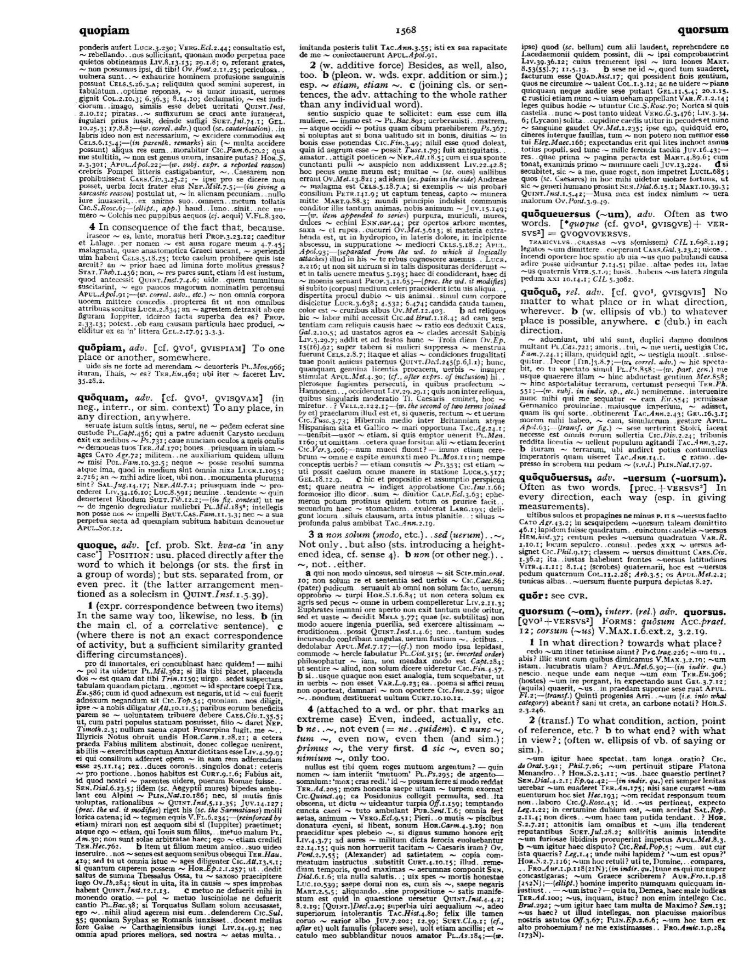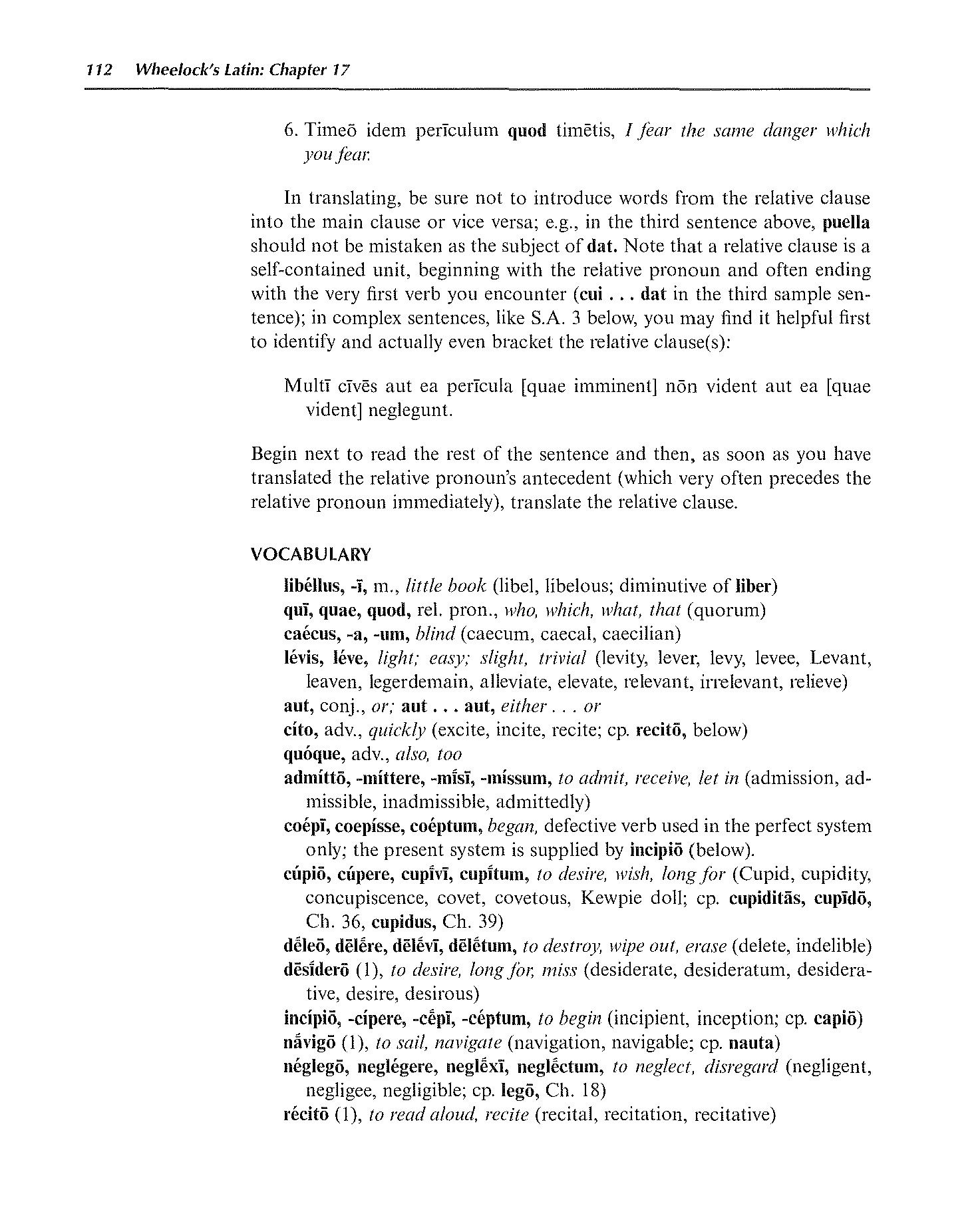
page_listing.tpl
page_subListingDetails.tpl
sub_listingDetails_style1.tpl
sub_listingDetails.title.tpl
quoque also
quoque is a Latin Adverb that primarily means also.
Definitions for quoque
Wheelock's Latin
Adverb
- 1
also, too
Oxford Latin Dictionary
Adverb
- 1
(expr. correspondence between two items) In the same way too, likewise, no less. (b) (in the main cl. of a correlative sentence). (c) (where there is not an exact correspondence of activity, but a sufficient similarity granted differing circumstances).
- 2
(w. additive force) Besides, as well, also, too. (b) (pleon. w. wds. expr. addition or sim.); esp. ~ etiam, etiam ~. (c) (joining cls. or sentences, the adv. attaching to the whole rather than any individual word).
Sentences with quoque
Latin to English
Quid tibi praecipiam teneros quoque mittere versus?Compare Shall I bid you send tender verses also?
Quae bello est habilis, Veneri quoque convenit aetas.Compare The age that is meet for the wars is also suited to Venus.
Patriae quis exsul se quoque fugit?Compare What exile from his country finds that he has left himself also behind?
Aude, hospes, contemnere opes et te quoque dignum finge deo, rebusque veni non asper egenis.Compare Have the courage, my guest, to despise possessions; train yourself, as he, to be worthy of godhead: don't be intolerant of poverty.
Quie cupiet, metuet quoque.Compare He who shall have desires will have fears too.
Nisi forte rebus cunctis inest quidam velut orbis, ut quem ad modum temporum vices, its morum vertantur; nec omnia apud priores meliora, sed nostra quoque aetas muta laudis et artium imitanda posteris tulit.Compare Possibly there is in all things a kind of cycle, and there may be moral revolutions just as there are changes of seasons. Not was everything better in the past but our own age too has produced many specimens of excelence and culture for posterity to imitate.
Adeo facinora atque flagitia sua ipsi quoque in supplicium verterant.Compare So completely has his crimes and infamies recoiled, as a penalty on himself.
Data sources
Notes
- Definitions
- Frederick M. Wheelock, Wheelock's Latin, 6th ed., rev. Richard A. LaFleur (New York, NY: HarperCollins Publishers, 2005): 112.
- P. G. W. Glare, Oxford Latin Dictionary, Vols. 1-8 (Oxford: Clarendon Press, 1982): 1568.
- Word frequencies
- Christopher Francese, "Latin Core Vocabulary," Dickinson College Commentaries, last modified 2014, http://dcc.dickinson.edu.
- Paul B. Diederich, The Frequency of Latin Words and Their Endings, PhD diss., (Columbia University, 1939).
- Louis Delatte, Suzanne Govaerts, Joseph Denooz, and Etienne Evrard, Dictionnaire fréquentiel et index inverse de la langue latine [Frequency Dictionary and Inverse Index of the Latin Language] (Liège, Belgium: Laboratoire d'analyse statistique des langues anciennes de l'Université de Liège [L.A.S.L.A.], 1981): 119.
Bibliography
Allen, Joseph H. Allen and Greenough's New Latin Grammar for Schools and Colleges: Founded on Comparative Grammar. Edited by James B. Greenough, George L. Kittredge, Albert A. Howard, and Benjamin L. D'Ooge. Boston, MA: Ginn & Company, 1903.
Crystal, David. A Dictionary of Linguistics and Phonetics. 6th ed. Oxford, UK: Blackwell Publishing, 2008.
Delatte, Louis, Suzanne Govaerts, Joseph Denooz, and Etienne Evrard. Dictionnaire fréquentiel et index inverse de la langue latine [Frequency Dictionary and Inverse Index of the Latin Language]. Liège, Belgium: Laboratoire d'analyse statistique des langues anciennes de l'Université de Liège (L.A.S.L.A.), 1981.
Diederich, Paul B. The Frequency of Latin Words and Their Endings. PhD diss., Columbia University, 1939.
Francese, Christopher. "Latin Core Vocabulary." Dickinson College Commentaries. Last modified 2014. http://dcc.dickinson.edu/latin-vocabulary-list.
Gildersleeve, Basil L., and Gonzales Lodge. Gildersleeve's Latin Grammar: Third Edition, Revised, and Enlarged. 3rd ed. London, England: Macmillan and Co., 1903.
Glare, Peter G.W. Oxford Latin Dictionary. Vols. 1-8. Oxford, England: Clarendon Press, 1982.
Krüger, Bernd. "Latin Conjugation Tables." Cactus2000. Accessed May 5, 2023. https://latin.cactus2000.de/index.en.php.
Pierson, Nick. "Sound of Text." Accessed October 26, 2019. https://soundoftext.com.
Wheelock, Frederick M. Wheelock's Latin. 6th ed. Revised by Richard A. LaFleur. New York, NY: HarperCollins Publishers, 2005.
Wiktionary Contributors. "Victionarium." Wikimedia Foundation, Inc. Updated March 18, 2019. https://la.wiktionary.org/wiki/Victionarium:Pagina_prima.
Citation
Chicago (17th ed.)
Allo Contributors. "quoque (adv.) - Latin Word Definition." Allo Latin Dictionary. Last modified . Accessed February 19, 2026. http://ancientlanguages.org/latin/dictionary/quoque.
Entry created on . Last updated on .







